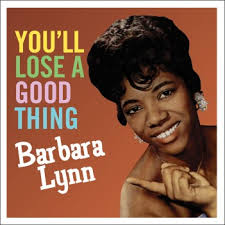| "You'll Lose a Good Thing" | |
|---|---|
 | |
| Single by Barbara Lynn | |
| from the album You'll Lose a Good Thing | |
| B-side | "Lonely Heartache" |
| Released | April 17, 1962 [1] |
| Recorded | 1962 |
| Studio | J&M (New Orleans, Louisiana) |
| Genre | Rhythm and blues |
| Length | 2:53 |
| Label | Jamie Records [2] |
| Songwriter(s) | Barbara Lynn Ozen |
| Producer(s) | Huey P. Meaux |
| "You'll Lose a Good Thing" | ||||
|---|---|---|---|---|
 | ||||
| Single by Freddy Fender | ||||
| from the album Rock 'N' Country | ||||
| B-side | "I'm to Blame" | |||
| Released | January 1976 | |||
| Recorded | 1975 | |||
| Studio | SugarHill (Houston, Texas) [3] | |||
| Genre | Country | |||
| Length | 2:53 | |||
| Label | ABC-Dot Records | |||
| Songwriter(s) | Barbara Lynn Ozen | |||
| Producer(s) | Huey P Meaux | |||
| Freddy Fender singles chronology | ||||
| ||||
"You'll Lose a Good Thing" is a popular song written by rhythm and blues artist Barbara Lynn Ozen, who, performing as Barbara Lynn, scored a 1962 Top 10 hit, peaking at #8 and also the number 1 spot on the R&B charts, [4] with her bluesy rendition of the song. [5]